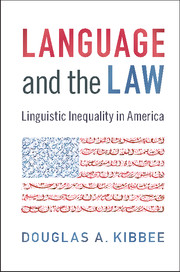Book contents
- Frontmatter
- Contents
- Preface
- Acknowledgments
- 1 Equality, Liberty, and Fairness in America
- 2 Language and Democracy
- 3 Linguistic Inequality in the Legal System
- 4 Language and Education
- 5 Government, Public Services, and the English-Only Movement
- 6 Language in the Workplace
- 7 Conclusions
- Bibliography
- Index of Court Cases
- Index of Names
- General Index
4 - Language and Education
Published online by Cambridge University Press: 05 August 2016
- Frontmatter
- Contents
- Preface
- Acknowledgments
- 1 Equality, Liberty, and Fairness in America
- 2 Language and Democracy
- 3 Linguistic Inequality in the Legal System
- 4 Language and Education
- 5 Government, Public Services, and the English-Only Movement
- 6 Language in the Workplace
- 7 Conclusions
- Bibliography
- Index of Court Cases
- Index of Names
- General Index
Summary
From the earliest days of the Republic, government at all levels has recognized its vital interest in education. An educated citizenry is crucial to participation in government and to economic productivity. To achieve these goals competence in languages other than English has sometimes been perceived as a threat, sometimes as a boon. Equality and liberty are at play, invoking the competing powers of the levels of government in a federal system and the competing powers of the divisions of government in our checks-and-balances system.
What is the goal of language education? For some education seeks reproduction of the dominant culture, presenting its history as the common heritage of the nation. This approach is justified as providing students with the practical knowledge necessary to function economically and socially in our society. The curriculum in the schools and the books chosen to support it teach children what it is to be American (Ramsey 2010, 9), defined, often, as white, Protestant, and of English origin. A contemporary example is E. D. Hirsch, Jr. (1988), who describes a “civil religion” and a “national vocabulary” as “national givens”: “Our civil religion defines our broadly shared values as a society, and our national vocabulary functions, or should function, as our broadly shared instrument of communication (1988, 103).” These are not, he argues, reflections of the “coherent culture of a dominant class” (ibid.). Constant through this approach, from the Know-Nothings of the 1850s to the English-only movement of the early twenty-first century, is a fear that new immigrants are different from previous immigrant groups, that they are refusing to assimilate, and that their knowledge of a second language and culture will diminish allegiance to the dominant national culture. Early in the twentieth century the Commission on Naturalization found that “the proposition is incontrovertible that no man is a desirable citizen of the United States who does not know the English language” (1905, 11). The learning of English does not mean that the mastery of the immigrants’ native language is not a valuable goal for American society. Often, however, it has been perceived as an either/or rather than a both/and proposition, and the dominant group has sabotaged English acquisition while stoutly demanding it.
- Type
- Chapter
- Information
- Language and the LawLinguistic Inequality in America, pp. 83 - 145Publisher: Cambridge University PressPrint publication year: 2016



